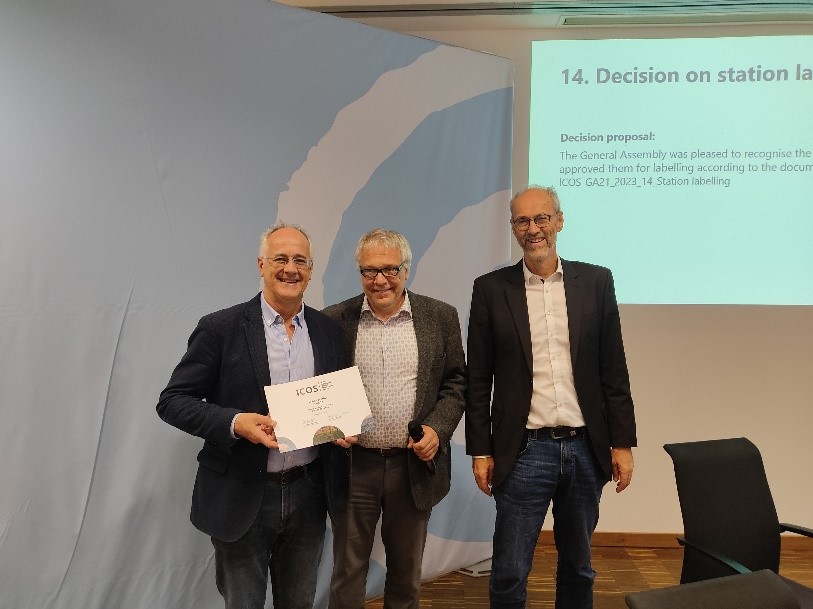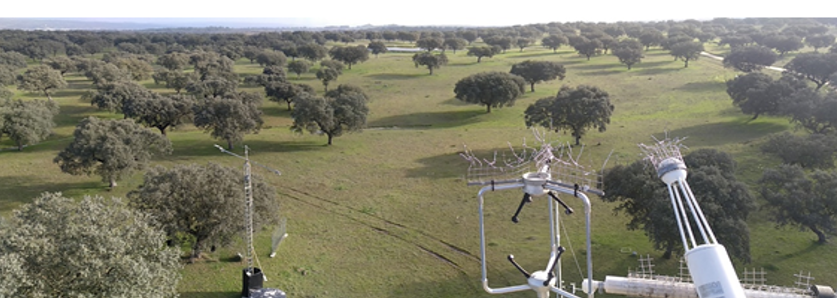CanOA-SOOP and Majadas de Tiétar complete the ICOS-ERIC certification process
M. González-Dávila1, A. Carrara2, C. Torres3, and S.F. León-Luis4
1Institute of Oceanography and Global Change (IOCAG), University of Las Palmas de Gran Canaria (ULPGC), Las Palmas de Gran Canaria, Spain.
2Mediterranean Center for Environmental Studies (CEAM), Valencia, Spain.
3Izaña Atmospheric Research Center (IARC), State Meteorological Agency (AEMET), Spain
4TRAGSATEC, Spain
Contact: ctorresg@aemet.es
The 21st General Assembly of the Integrated Carbon Observation System (ICOS) held in Offenbach am Main (Germany) on 14 and 15 November 2023 enabled the participating countries to reach important agreements for the future of this European greenhouse gas observation network. One of the issues addressed was to approve and finalise the certification stage of several stations, following the receipt of a favourable report from the network's thematic centres. This certificate is issued once it has been verified that the station and its instrumentation has passed the strict technical criteria established, and that its principal investigator validates, following ICOS criteria, a preliminary series of data. In this aspect, Spain and its national network played an important role because two of its stations, the oceanic station CanOA-SOOP and the associated ecosystem station Majadas de Tiétar, completed this process, becoming fully recognised stations within ICOS. Their observations will now be included in the ICOS data portal, Carbon Portal, allowing the entire scientific community and society in general to access their data.
The CanOA Ocean Station is a surface ocean observation platform (SOOP) installed on the container ship, MV Jona Sophie, which connects the Canary Islands with Barcelona. The vessel calls at the ports of Gran Canaria, Tenerife and Lanzarote and then sails to the ports of Sagundo (Valencia) and Barcelona. The CanOA-SOOP line runs every week through the eastern region of the Canary Islands, continues through the eastern region of the North Atlantic Ocean to the Strait of Gibraltar, and from there to Barcelona via the western part of the Mediterranean Sea, making the return journey the following week. This ocean station was established in February 2019 and with Spain joining ICOS in 2021, it was one of the first two proposed stations. In the last two years, the work developed by Melchor Dávila, principal investigator of the station, and the rest of the members of the Marine Chemistry group (QUIMA) of the University of Las Palmas de Gran Canaria has made it possible to adapt this ocean observation platform to the established technical requirements. Now, ICOS has approved its integration as a Class 2 station but, with the recent installation of a new sensor, it will be admitted as a Class 1 station in April 2024.
In parallel, CanOA-SOOP is integrated into a wider network for ocean acidification observation in the Canary Islands region, the CARBOCAN network funded by the Canary Islands Government.

(Left to right) Melchor Dávila, principal investigator of CanOA-SOOP receives the diploma certifying the completion of the certification process from Werner Kutsch, Director General of ICOS-ERIC and Christian Plass-Dülmer, who holds the German Presidency of the ICOS-ERIC General Assembly.
In addition, the associated ecosystem station Majadas de Tiétar is located in the province of Cáceres (Extremadura) in a holm oak (Quercus Ilex) forest. This ecosystem covers more than 3.5 million hectares, mainly concentrated in the southwest of the Iberian Peninsula. This unique and impressive ecosystem was classified as a natural habitat by the European Union in 1992 (Directive 92/43/EEC).
This station began operating in 2003 with the installation of the first 15-metre "Eddy covariance" flux tower to continuously measure water (H2O) and carbon dioxide (CO2) fluxes in this ecosystem. Today, the station has an exceptional and unique infrastructure in the Iberian Peninsula and its observations contribute significantly to the results obtained in numerous European, national and regional research projects.
Arnaud Carrara is the main researcher at this station, and his extensive experience in this field of research and that of the other researchers at the Centre for Environmental Studies of the Mediterranean (CEAM) led to Majadas de Tiétar being selected as an instrumental test site and demonstration station for ICOS ecosystems. Finally, it should be noted that Majadas de Tiétar participates in other national research networks such as Carbored, managed by the CEAM, and international networks such as FLUXNET.

Figure 2. Aerial view of the holm oak forest taken from one of the water (H2O) and carbon dioxide (CO2) flux monitoring towers installed at the Majadas de Tiétar station.
These two stations, together with the Izaña Observatory in May 2023, have obtained the approval of the ICOS General Assembly during 2023. This demonstrates the strong commitment of Spanish researchers to consolidate, in the shortest possible time, their stations within the ICOS structure.
In addition to these stations, the ICOS-Spain national network includes three other stations, El Arenosillo, CIBA and ESTOC, which have begun, and possibly in the coming months will complete, some of the intermediate stages defined in the certification process.
